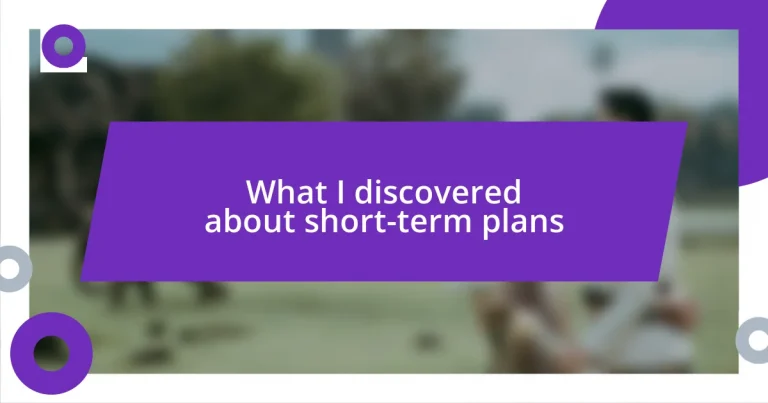Key takeaways:
- Short-term plans are flexible and facilitate quick adjustments, enhancing motivation and reducing stress.
- Common challenges include overcommitment, lack of flexibility, unrealistic expectations, and distractions, all of which can hinder progress.
- Evaluating outcomes and making adjustments based on reflection and feedback are essential for improving future planning efforts.
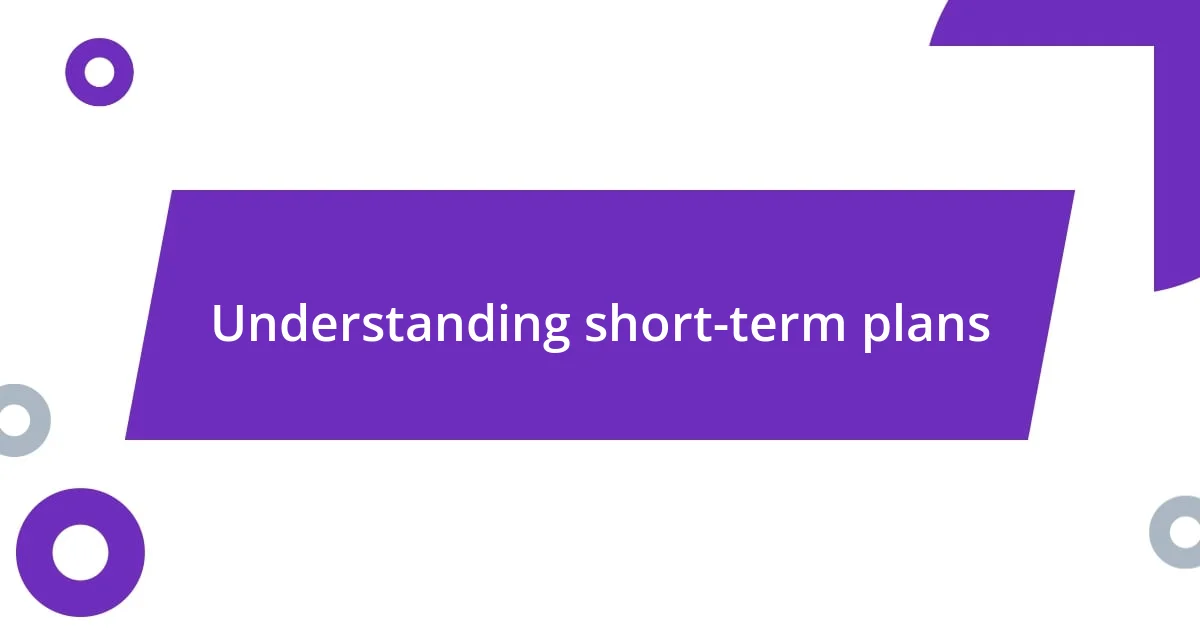
Understanding short-term plans
Short-term plans are really about setting achievable goals within a limited timeframe, typically ranging from a few days to a few months. I remember when I decided to plan a short getaway last summer; it started out as a spontaneous idea but quickly became a rewarding escape. Isn’t it fascinating how a simple decision can lead to a meaningful experience?
When I think about short-term plans, I often reflect on their flexibility. Unlike long-term goals, which can sometimes feel daunting, short-term plans allow us to adapt quickly to changes in life. For instance, I once had a week blocked out for a writing project that required improvisation due to unexpected family obligations. It taught me that having a solid plan while being open to change can yield unexpected rewards.
In developing these plans, it’s essential to identify priorities that resonate with our current circumstances. Have you ever felt overwhelmed by options? I certainly have. By focusing on what truly matters in the immediate future, we not only clarify our intentions but also create a motivated mindset.
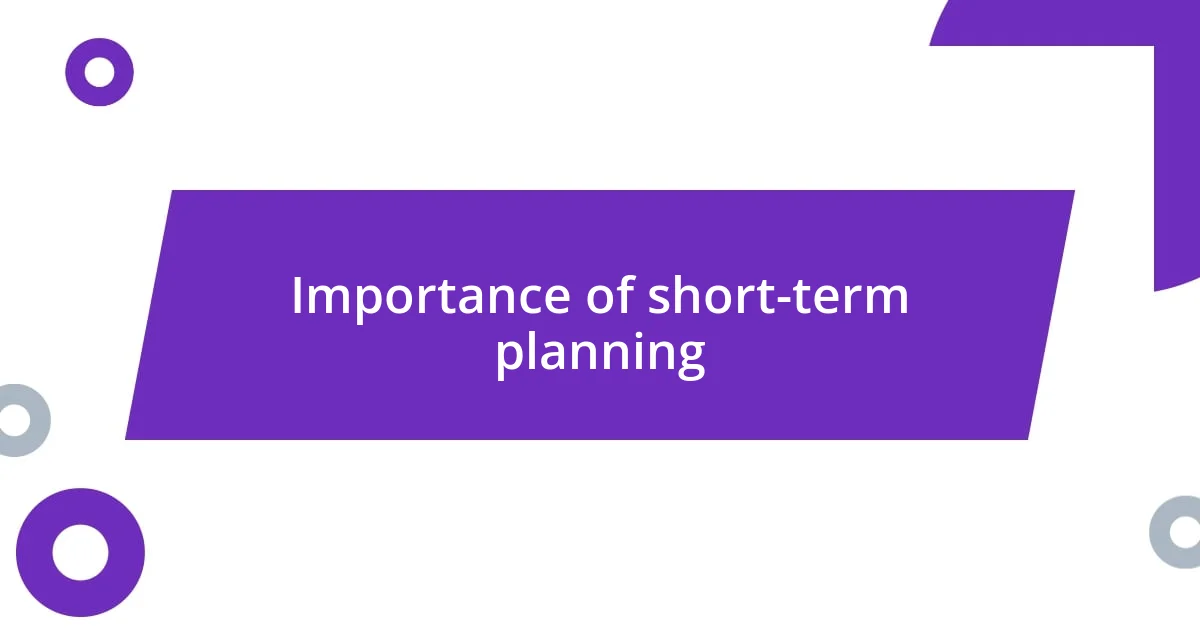
Importance of short-term planning
Short-term planning is crucial because it creates a roadmap for quick wins. In my experience, when I outline tasks for the week on a Sunday evening, I feel a wave of motivation wash over me. There’s something incredibly satisfying about checking off small tasks that lead to bigger objectives. It’s like gaining momentum; each completed item fuels my energy for the next.
Another important aspect is that short-term plans enable rapid adjustment to unforeseen circumstances. I recall a period when unexpected deadlines started piling up at work. My well-structured weekly plan helped me shuffle priorities effortlessly. Rather than feeling overwhelmed, I found clarity in chaos, which in turn significantly reduced my stress levels.
Moreover, short-term planning fosters accountability. I’ve relied on a buddy system for motivation on various projects, which has proven effective. We check in with each other weekly, discussing our short-term goals, and it keeps us focused and committed. It’s amazing how a shared sense of purpose encourages progress faster than going it alone.
| Importance of Short-Term Planning | Impact |
|---|---|
| Creates Momentum | Fosters motivation through quick wins |
| Enables Adjustment | Allows for changes in response to challenges |
| Encourages Accountability | Promotes a supportive environment for goal achievement |
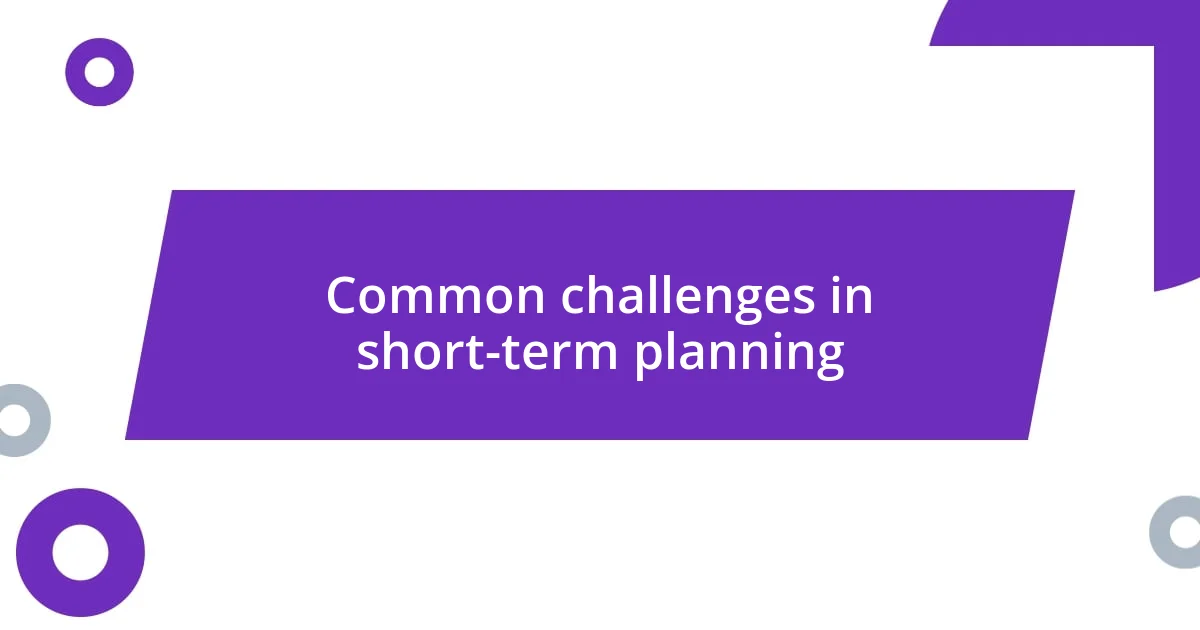
Common challenges in short-term planning
When embarking on short-term planning, I often find that the most common challenges can crop up unexpectedly. One issue that I encounter frequently is the temptation to overcommit; it’s so easy to pack our plans with too many tasks, believing we’ll have more time than we do. I remember vividly a week where I squeezed in three events and two work projects. The result? I felt like I was juggling too many balls while trying to walk a tightrope. It was exhausting, and I learned the hard way that quality matters more than quantity.
Here are some challenges that stand out in short-term planning:
- Overcommitment: Trying to do too much in a short timeframe can lead to burnout and stress.
- Lack of flexibility: Unexpected changes may derail plans, leaving us feeling flustered if we’re not prepared to adapt.
- Unrealistic expectations: Setting goals that are too ambitious can result in disappointment and diminish motivation.
- Poor prioritization: Without clear priorities, it’s easy to get lost in the noise of lesser tasks and lose sight of what really matters.
Another challenge that I’ve faced involves maintaining focus amid distractions. During a particularly busy week, I found myself constantly interrupted by notifications, making it tough to stick to my plan. It hit me hard when I realized that, instead of making progress, I was merely reacting to whatever was popping up on my screen. I’ve learned that creating a conducive environment for short-term planning is essential; something as simple as turning off notifications can dramatically improve my productivity.
Common distractions in short-term planning include:
- Digital interruptions: Constant notifications can derail concentration and sidetrack plans.
- Competing priorities: When multiple projects vie for attention, it can be difficult to focus on what’s most important.
- External pressures: Deadlines and expectations from others may impose unrealistic timelines, complicating already-set plans.
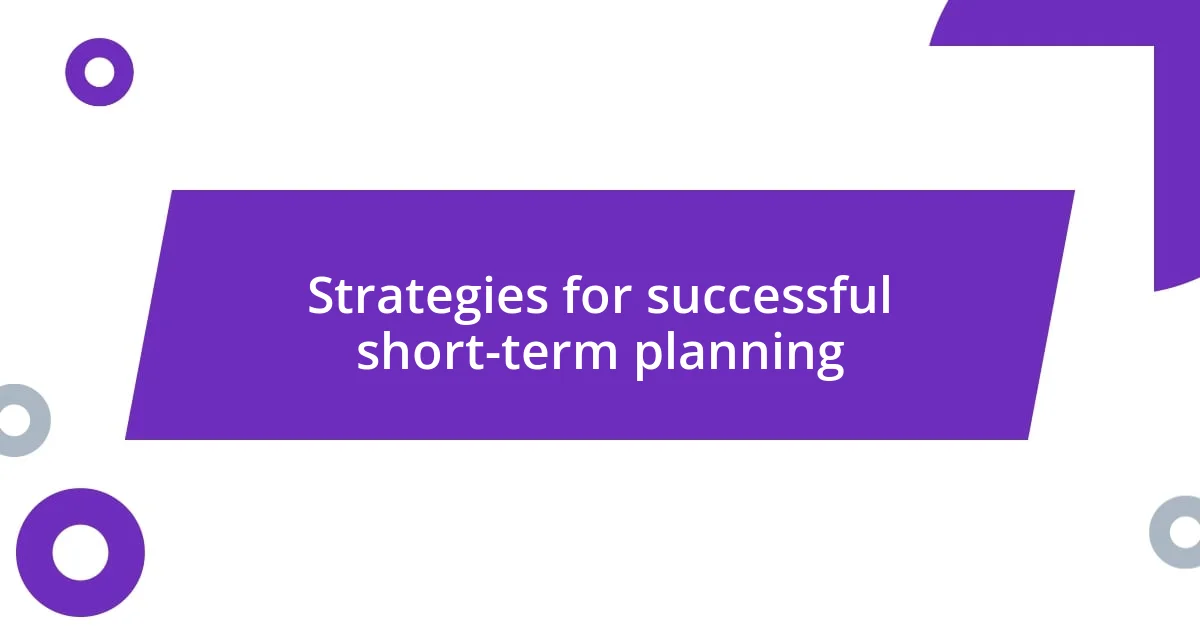
Strategies for successful short-term planning
When I think about successful short-term planning, the first strategy that comes to mind is prioritization. I’ve realized that taking a moment to identify what truly matters can make a world of difference. For instance, on days when I write down my top three tasks, I feel a sense of purpose guiding my actions. It’s easy to get caught up in the hustle of a busy schedule, but asking myself, “What will have the biggest impact today?” helps me stay aligned and productive.
Another effective approach is time blocking. I’ve adopted this strategy to allocate specific chunks of time for different tasks, and it’s been a game-changer. Imagine dedicating an uninterrupted hour solely to tackling emails; the efficiency is incredible! By consciously reserving my time in advance, I reduce the temptation to jump from one task to another, which often leaves me feeling drained. Have you ever experienced how much more you can achieve when you focus? I know I have!
Lastly, regular reflection is a cornerstone of successful short-term planning. After a week of following my plan, I like to review what went well and what didn’t. This practice not only gives me insight into my working habits but also fuels my motivation for the future. I remember one week when I felt overwhelmed, but through reflection, I discovered that I was underestimating the time it took to complete certain tasks. It taught me the value of adjusting my approach rather than giving up altogether. How do you ensure you learn from your planning experiences? For me, it’s all about evolving and refining my strategies as I go along.
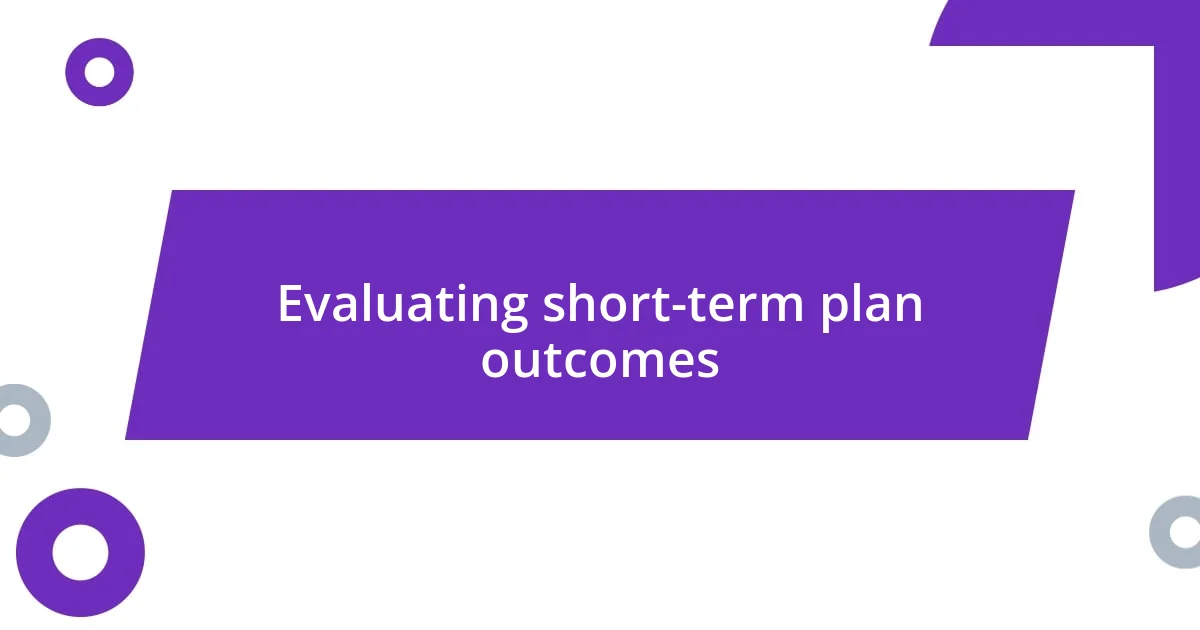
Evaluating short-term plan outcomes
Evaluating the outcomes of short-term plans requires a critical eye and a willingness to learn from the results. I often find that my initial excitement about a plan can cloud my judgment during evaluation. There have been instances when I thought a week went smoothly only to realize, through a simple review, that I hadn’t accomplished my most important tasks. It’s a humbling experience that reminds me of the importance of clear metrics for success.
After each short-term plan, I like to conduct a mini-debrief. I ask myself, “What really worked, and what didn’t?” For example, I once launched a project that I believed was a slam dunk, only to find out later that I had missed key deadlines. Reflecting on why that happened helped me see that I had overlooked the need to communicate with my team regularly. That lesson pushed me to incorporate check-in meetings as a staple in my planning process.
Ultimately, the evaluation process is about growth and adaptation. I think about the most successful moments in my plans; they stemmed from adjustments made in response to evaluation. It’s essential not just to tally up successes but also to understand the context behind them. Have there been moments when your evaluations have shifted your approach? I know for me, embracing the learning curve has led to a deeper understanding of not just my work but also my own working style.
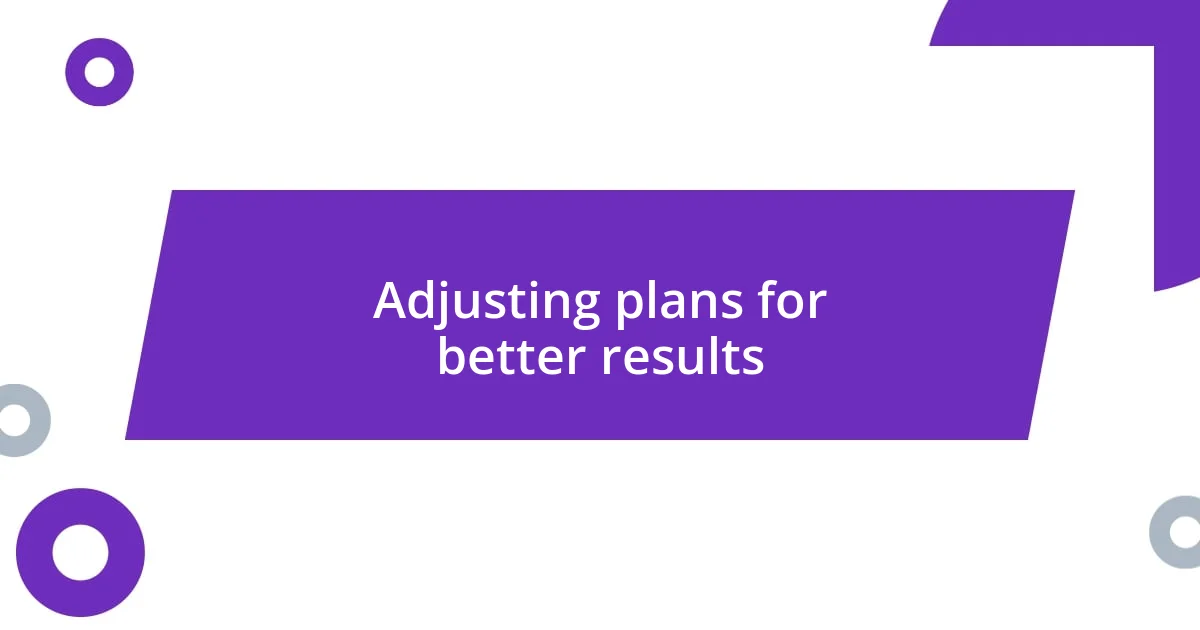
Adjusting plans for better results
Adjusting plans is vital for enhancing outcomes, and I’ve learned this through trial and error. One time, I was tackling a project that felt stagnant. After a few days, I realized I was sticking too rigidly to my original timeline. Embracing flexibility, I reshuffled my tasks and focused on one role at a time, which reignited my momentum. It’s remarkable how a small shift in perspective can rejuvenate your progress, isn’t it?
In my experience, regular check-ins with myself have been invaluable. I make it a habit to pause and assess whether my current actions align with my initial goals. For example, during a particularly busy week, I found that I was spending too much time on low-priority tasks. By simply asking myself, “Is this really the best use of my time?” I was able to reallocate my efforts toward high-impact items. This kind of reflection not only keeps my goals in sight but also ensures I don’t stray off course.
Sometimes, the adjustments I make are inspired by unexpected feedback. I remember working on a community event where my plans were well-intentioned but not resonating with my audience. After asking for input, it became clear that I needed to pivot and consider their preferences. Implementing their suggestions led to a more successful outcome than I could have anticipated. Have you ever experienced a moment when feedback changed your trajectory? Adjusting based on others’ perspectives is a powerful learning tool that I deeply appreciate.












